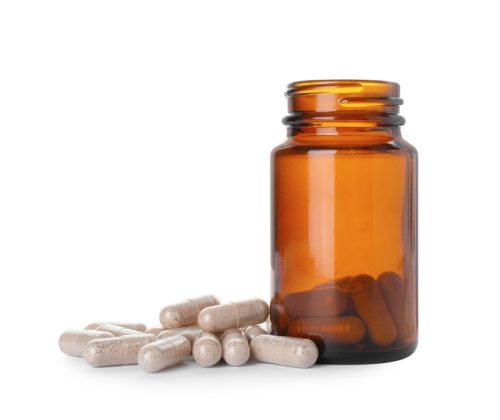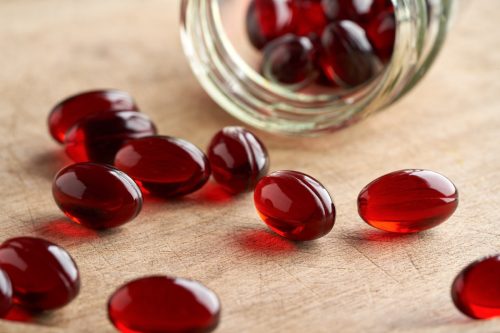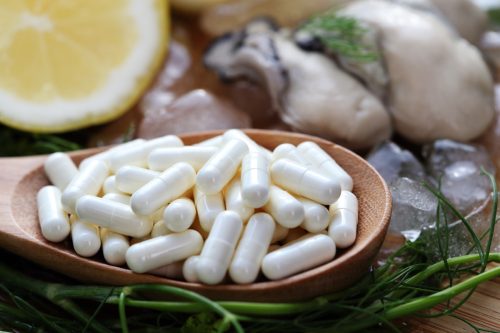Winter weather makes our health seem a little worse for clothes. As the temperature cools, we may face many problems, including respiratory ailments, headaches, and mood swings. And even if you focus on making sure you eat healthy, engage in regular exercise, and sleep well during the winter, it still might not be enough. That’s why doctors say certain supplements can be helpful during the colder months, giving your health a much-needed boost. Read on for their six best recommendations.
RELATED: 7 Supplements That Can Really Keep You From Getting Sick

Without a doubt, the “number one supplement” to consider taking this winter is vitamin D. Greg LopezPharmD, lead researcher for the Supplement and Nutrition Database test better life. While our bodies naturally make vitamin D themselves, they must be exposed to sunlight for it.
“But during the winter there’s less sunlight and we’re also more crowded, limiting further sun exposure, which lowers vitamin D levels.” He explains. “Having enough vitamin D in your system is important for muscle health in general and can give your immune system a little boost to help fight off winter infections.”
RELATED: New report says most Americans are seriously deficient in vitamin D. Here’s how to get more.

Compared to something like vitamin D, you may be less familiar with Pycnogenol, the brand name for French maritime pine bark extract. but Fred PescatoreMD, a Manhattan-based conventionally trained physician and internist who specializes in nutritional medicine, says he is a “firm believer” in the antioxidant properties of this winter supplement.
According to Pescatore, the potential health benefits of Pycnogenol during the colder months are strongly supported by research. In 2021, a study found that taking this supplement daily during the dry season “improves skin elasticity and firmness,” he noted.
Other studies have also found that it can “shorten the duration of colds, as well as treat nasal congestion and runny nose due to its natural anti-inflammatory and antioxidant properties.” Pescatore adds.

Omega-3 fatty acids can help rejuvenate your appearance Soma MandalMD, is a board-certified internist with Smith Health in New Providence, New Jersey.
“Ever feel like your skin is dry in the winter? This is a great formula to help combat dry, dull skin,” she says.
Related: I’m a dermatologist and I never use these 6 products in cold weather.

It’s not just your skin that you have to worry about in winter. Sia can’t see, MD, a board-certified ophthalmologist and founder of Eye Facts, warns that weather conditions this season can also significantly affect the health of our eyes. That’s why he recommends taking a lutein supplement now.
“Normally found in leafy greens like kale and spinach, lutein protects against eye strain and blue light damage, both of which many are exposed to in the winter,” Naguri explains.

Winter is cold and flu season, as we are all too aware. To help reduce the risk of getting sick, Lopez recommends supplementing with low levels of zinc.
“Zinc supplementation is often helpful in people with zinc deficiency, which can only be diagnosed by your doctor,” she notes. “If you have been taking zinc pills for weeks or months, I would recommend a dose of 20 mg or less per day.”
But López says that getting this supplement in a different form may also help in the case of an infection.
“Drinking a zinc lozenge when you feel the first symptoms of a cold can help reduce (but not cure) the symptoms of a cold,” she shares.
Related: 21 Surprising Signs You Have a Vitamin Deficiency

Just like zinc, vitamin C may help you fight off some winter ailments.
“This supplement supports the immune system and can help reduce the duration and severity of a cold or flu.” Zeeshan Afzal, MD, health expert and medical officer for health care company Velzo says. “It’s also an antioxidant that can protect against oxidative stress.”
But Afzal notes that caution should be exercised if you want to start using this supplement.
“Vitamin C is generally safe, but high doses can cause stomach upset in some people,” she points out. “Stick to recommended daily allowances unless advised otherwise by a healthcare provider.”
For more wellness advice delivered straight to your inbox, sign up for our daily newsletter.
Better Life offers the most up-to-date information from top experts, new research, and health agencies, but our content is not a substitute for professional advice. When it comes to medications you are taking or any other health questions you may have, always consult your healthcare provider directly.
#doctor #supplements
Image Source : bestlifeonline.com